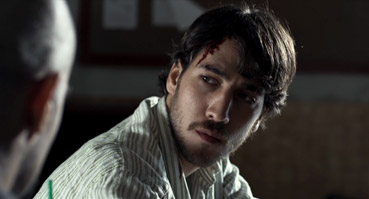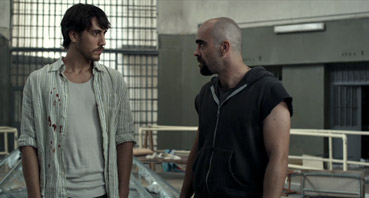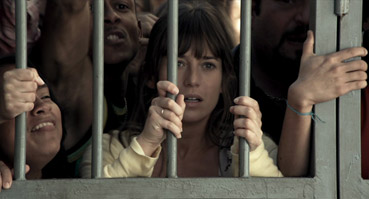|
In movies at least, there's an inherent tension in having just about any sympathetic character go undercover in a prison. Since the HBO TV drama Oz made us all too aware of how unpleasant being behind bars could be, movie prisons have been portrayed largely as a potentially lethal and gang controlled environments, with their own set of unspoken laws enforced by convincingly dangerous and usually merciless men. Enter a movie prison as a wide-eyed innocent and it's likely only a matter of time before you'll be raped, beaten or shanked (I term I learnt from movies rather than newspapers or books), or be forced to participate in some dastardly scheme organised by the hardest bastard on the block. But to walk into this world willingly as a spy for the opposition is like striding naked covered in honey through a field of furious wasps. You may be wily and tough, but here you'll soon find yourself isolated and vulnerable, and if you're true identity is revealed then you'll almost definitely be killed or tortured by men armed with crude home-made weapons who will take pleasure in the task and laugh at your pleas for mercy. Thus the moment a cop in even the most unremarkable of films volunteers to pose as a prisoner to investigate an inmate, I'm automatically on edge. Such enterprises rarely go to plan. Let's face it, there wouldn't be a movie if they did. There's always someone inside who never really trusts our man, and you can almost guarantee that some long-term criminal that he once arrested will be transferred to the prison shortly before the job is complete.
With all that in mind, consider the setup from Cell 211, the film adaptation of the novel by Francisco Pérez Gandul. The day before he starts work as a guard at a dilapidated prison, young Juan is being given a tour of his new workplace when he is injured by falling masonry. Juan's fellow officers take the dazed and bleeding Juan to the empty Cell 211 to check his injuries, but when a riot led by a particularly dangerous prisoner named Malamadre kicks off, the officers abandon Juan and run for their lives. When discovered by the other inmates, Juan claims to be a new prisoner convicted of first-degree murder. Initially distrusted, he soon bluffs his way into Malamadre's good books and finds himself caught between his moral convictions and what he must do to protect himself from discovery and harm.

All of this happens in a surprisingly short space of time, with director Daniel Monzón expending only a few minutes introducing Juan before placing him at the mercy of prison life and its most feared inmate. This does mean that he finds himself in mortal peril before we've really had a chance to engage with him as a character and the film thus relies on us sympathising with his situation rather than the man himself, at least in the early stages. And as I suggested above, we do – after all, you don't have to have spent time in prison to empathise with someone surrounded by a large group of fired-up and dangerous aggressors. Yeah, how were your school years? And Oz and its ilk have left us in no doubt about the horrible consequences should things turn nasty. As with young Malik in Jacques Audiard's standard-setting Un prophète, we get to know and engage with Juan over time because he's likeable and resourceful and a natural audience identification figure, not because we're shown flashbacks of him happily interacting with his pretty and heavily pregnant wife Elena. But in one of the film's many neat misdirections, those brief but economical sequences prove to have a rather different purpose, and despite a few very effective if almost by-the-book wind-ups (Juan tries to communicate with his colleagues on a stolen walkie-talkie that Malamadre then notices is missing; a man who knows Juan's true identity is taken hostage by the prisoners; Elena doesn't believe the official bluff about her husband's wellbeing and instead of going home heads straight for the prison), Juan's story does not play out as genre convention has led us to expect.
The initial presentation of Malamadre as a figure of almost mythical threat – something neatly conveyed by focussing on the back of his shaved head as he walks and not revealing his face even when he throttles a guard – is also nicely usurped when he sits down with Juan and tells him the story of cell 211's previous occupant, a man whose cancer was ignored by the authorities until it drove him to suicide. It's a key exchange that kicks off the process of humanising the man the authorities have cast as a monster, and is the first step in Juan's growing sympathy with the prisoners' cause and their pent-up anger, something he will later get to experience first hand. The suicide itself, meanwhile, makes for a haunting and startlingly realistic opening scene (and is sadly based on a true story), one whose tone is reminiscent of John Hillcoat's 1988 Ghosts ... of the Civil Dead, an extraordinary Australian prison drama that prefigured Oz in the frankness of its brutality and its 'New Age' prison setting.

It's the developing relationship between Juan and Malamadre, which intermittently casts the latter as a father figure who is willing to nurture his boy's talent but still rule with an iron rod, that give the film its emotional core. Malamadre is simultaneously impressed with and threatened by Juan's tactical knowledge and possible leadership potential, publicly supporting his initiative but privately threatening him with the consequences of showing him up or acting without his prior authority. It's a friendship, of course, that movie convention assures us is unlikely to work out well for either man. What does catch you out is the speed with which Juan is transformed from morally upright innocent to desperate inmate, with a year's worth of institutionalised brutalisation compressed into a few fateful hours by environment and circumstance.
Cell 211 is being promoted in that Hollywood pitch fashion as "Die Hard meets A Prophet," and there's no doubt that Audiard's movie was a key influence on director Daniel Monzón's approach, in the authenticity of the background detail (like Audiard, Monzón has peppered the supporting cast with real prison inmates), in the physical similarity between Juan and Un prophète's Malik, and in the moral transformations they undertake while inside. But Cell 211 is tonally and structurally different enough not to languish in Un prophète's shadow, in the high octane pace of its action (the rioting is handled with breathless documentary realism and a race-against-time dash through the prison to thwart an armed raid is thrillingly shot and cut and scored like a racing heartbeat) and the very different paths the two film's lead characters later find themselves walking. Cell 211 also skirts intriguingly with Spanish political history with the inclusion of three ETA prisoners,* high-profile inmates who are protected from official harm by an agreement between the Spanish and Basque governments and who become a bargaining tool for the rioters and a tactical nightmare for the authorities.

Given the gateway opened for foreign language prison movies by Un prophète, it's a little surprising that Cell 211 has not been more widely seen and discussed in the UK, given its critical and festival success on home turf and its virtual board sweep at the 2010 Goya Awards (the film landed eight major prizes, including Best Film, Best Actor, Best New Actor, Best Actress and Best Screenplay, and was nominated for eight more). For me it never quite matches the intensity, complexity and sustained tension of Audiard's extraordinary film, and despite consistently fine work by a top notch cast (Luis Tosar as Malamadre and newcomer Alberto Ammann as Juan deserve special mention here), its characters feel less fully developed, if no less authentic and every bit as memorable. But Cell 211 is still a tightly directed and well structured take on a well-worn genre and a gripping supposition on how exposure to injustice and enforced incarceration can unleash the dark side of even the best of us.
In common with a good many modern features, Cell 211 was shot digitally on the Red One Camera at an aspect ratio of 1.78:1, which was then cropped to 1.85:1 for the cinema release. This does mean that the image here, though clean and impressively detailed, does not quite have the richness or contrast ratio tolerance of film, resulting in a small loss of detail at both ends of the spectrum. This is most evident in the earthy colour bias of the prison interior – daytime exteriors are more naturally colour graded and tend to look fine. As you would expect, there's not a dust spot to be seen. Somewhat surprisingly, the English subtitles are fixed.
The presence of a Dolby 5.1 track doesn't always mean true surround sound, but you do get it here, with effective use made of the full sound stage for background and specific sound effects inside the prison, less so in the rioting outside. The Dolby stereo 2.0 matches the 5.1 on clarity and range, but loses out on inclusivity.
Daniel Monzón interview (21:15)
The director talks energetically in English about adapting the novel, researching the script, the information he gleaned from talking to genuine actual and prison guards, the elements drawn from real life, the casting, the documentary approach, the public reaction and critical acclaim, and a whole lot more. An information-packed twenty minutes (Monzón is a fast talker and rarely pauses for breath) that is best left until after the film if you want to avoid small spoilers.
Making of Cell 211 (26:28)
A pre-release promo of decent length that focuses on the characters, the casting, the direction, the visuals and the action. Useful interviews with the director, the lead actors, and art director Antón Laguna are intercut with behind-the-scenes footage and clips from the film. Although clearly designed to sell the film (the final round-up of "what you can expect" comments confirms this), it's best not to watch it just before the film, as there are a few small giveaways here.
A consistently involving, thoughtfully written and smartly made prison drama that fulfils director Monzón's ambition of making a film with a Spanish identity that is driven by character, and that doesn't simply pay homage to American and British prison dramas of years past. The transfer on Studiocanal's DVD is solid enough (it's also being released on Blu-ray), and the extras, though few in number, are well worth a look. See it before the inevitable American remake comes along and attempts to eclipse its memory.
|